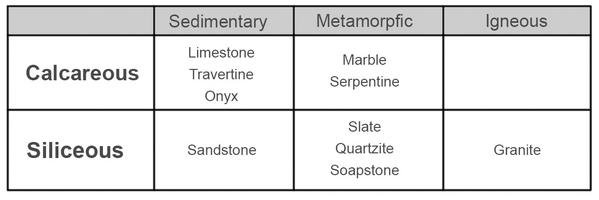Taking care of your natural stone
There’s nothing more beautiful than the permanence of natural stone. With the right care and regular maintenance, your stone can last a lifetime.
Natural stone is categorized into three basic geological classifications by their respective formation processes: Sedimentary, Metamorphic and igneous. Additionally, stones in each category can be either Calcareous or Siliceous.
Calcareous (Marble, Serpentine, Limestone, Travertine, Onyx)
This type of stone is composed mainly of calcium carbonate, a chemical compound commonly found in natural stone, shells and pearls. Calcium Carbonate is sensitive to acidic solutions so mild, non-acidic cleaners are recommended.
Siliceous (Granite, Quartzite, Slate, Soapstone, Sandstone)
This type of stone, as the term implies, is one composed primarily of silicates, such as quartz, feldspar, mica, etc. as such, a siliceous stone is generally resistant to most acids found in kitchen settings, although acidic cleaners are still not recommended, as these stones may contain trace levels of minerals that are acid sensitive.

Cleaning
- Clean stone surfaces with a neutral cleaner, stone soap, or a mild liquid dishwashing detergent and warm water.
- Similar to any item cleaned in your home, an excessive concentration of cleaner or soap may leave a film and cause streaks.
- Follow manufacturer recommendations.
- Use a clean rag mop on floors and a soft cloth for other surfaces for best results.
- Rinse the surface thoroughly after washing with the soap solution and dry with a soft cloth.
- Change the rinse water frequently.
- In the bath or other wet areas, soap scum can be minimized by using a squeegee after each use. To remove soap scum, use a non-acidic soap scum remover or a solution of ammonia and water (about 1/2 cup ammonia to a gallon of water). Frequent or over-use of an ammonia solution may eventually dull the surface of some stone types.
- In outdoor pool, patio or hot tub areas, flush with clear water and use mild bleach solution to remove algae or moss.
Cleaning products
- Many suppliers offer products used for stone cleaning.
- Products containing lemon, vinegar or other acids may dull or etch calcareous stones.
- Scouring powders or creams often contain abrasives that may scratch certain stones.
- Many commercially available rust removers (laundry rust stain removers, toilet bowl cleaners) contain trace levels of hydrofluoric acid (HF). This acid attacks silicates in addition to other minerals. All stones, including granite and quartzite, will be attacked if exposed to HF.
- Do not mix ammonia and bleach. This combination creates a toxic and lethal gas.
Sealing
Sealers have come a long way during the years, you can always consult with your fabricator/installer on which kind of sealer they use and its performance. Recommended sealers for natural stones are Non water based sealer, with smaller molecules, this sealer penetrate in the porous of the stone for a longer lasting period.
We recommend Stain Proof sealer produced by the brand Dry Treat. This sealer molecules are hundreds of times smaller than competitor stone sealers and penetrate much deeper into the pore structure and retains natural surface color and finish. 15 year written performance warranty can be provided if applied by a Dry-Treat Accredited Applicator. (MORE INFORMATION)
Repair
Depending of what type of stone you have, some damages may occur. Maybe scratches or etching on marble surfaces, or chips around the sink etc. But all this and almost everything can be fix. That is the beauty of having natural stone, solid rock that can be buffed or repolished as many times you need. Hiring a stone restoration professional will be a guaranteed solution.
